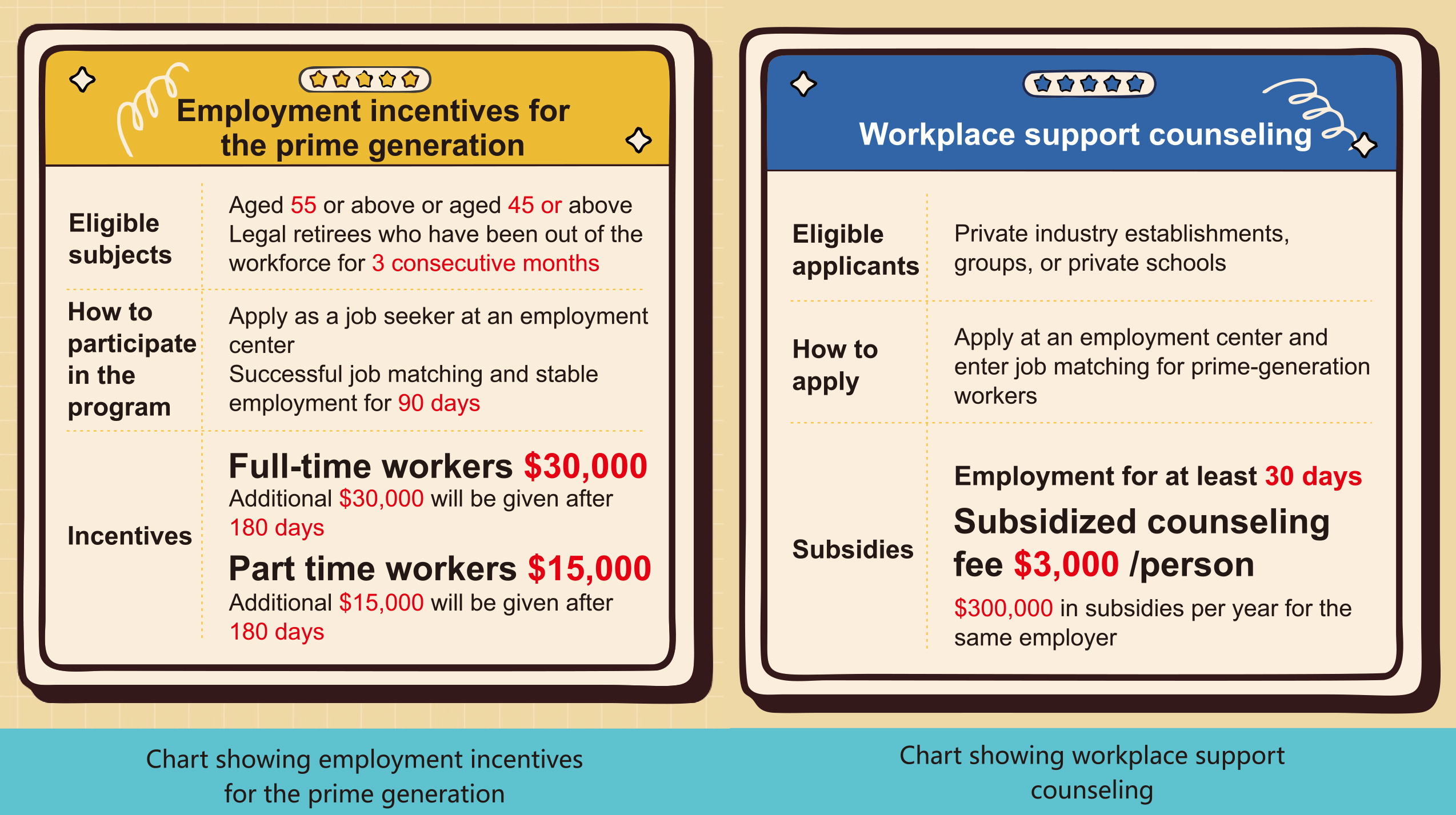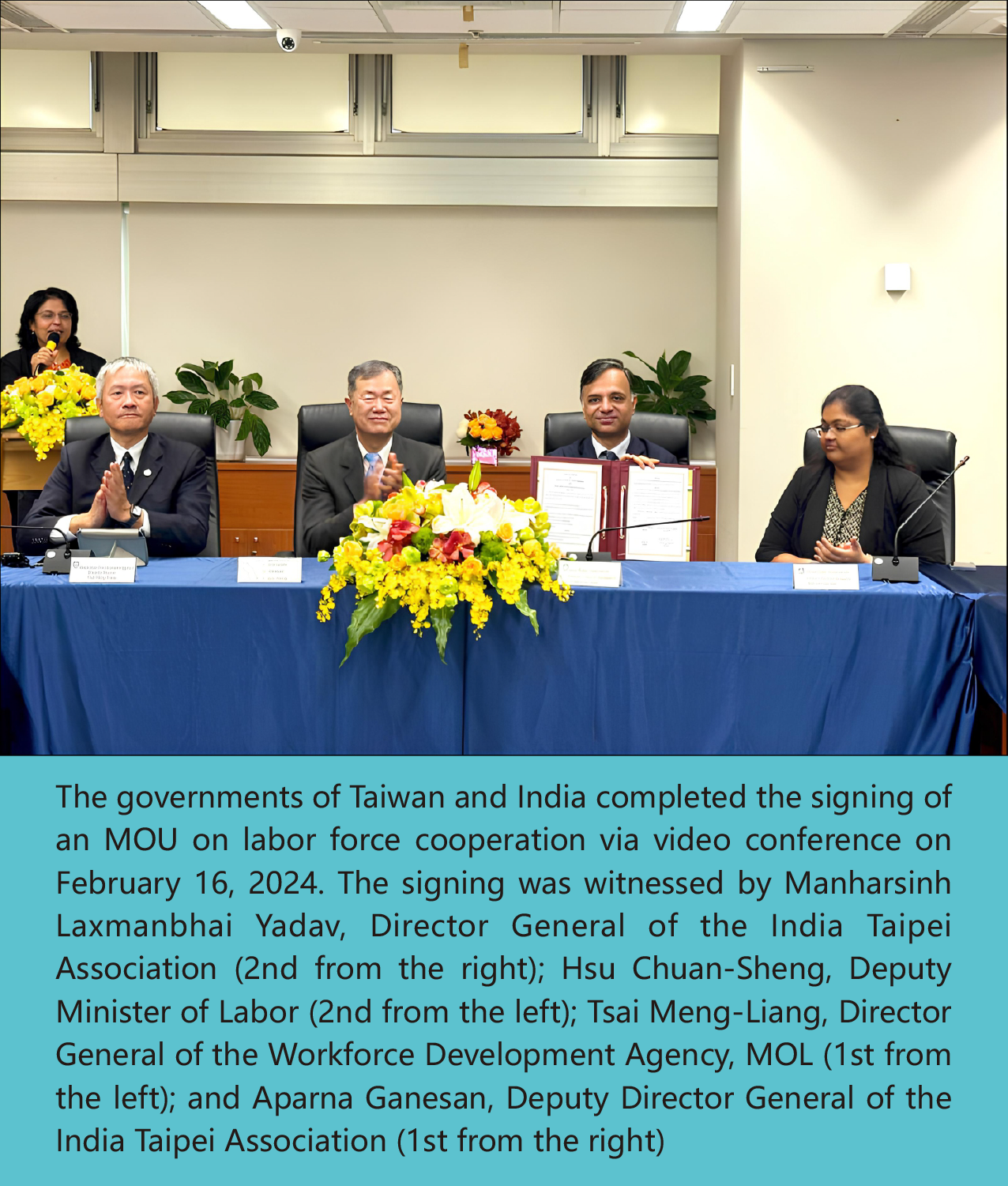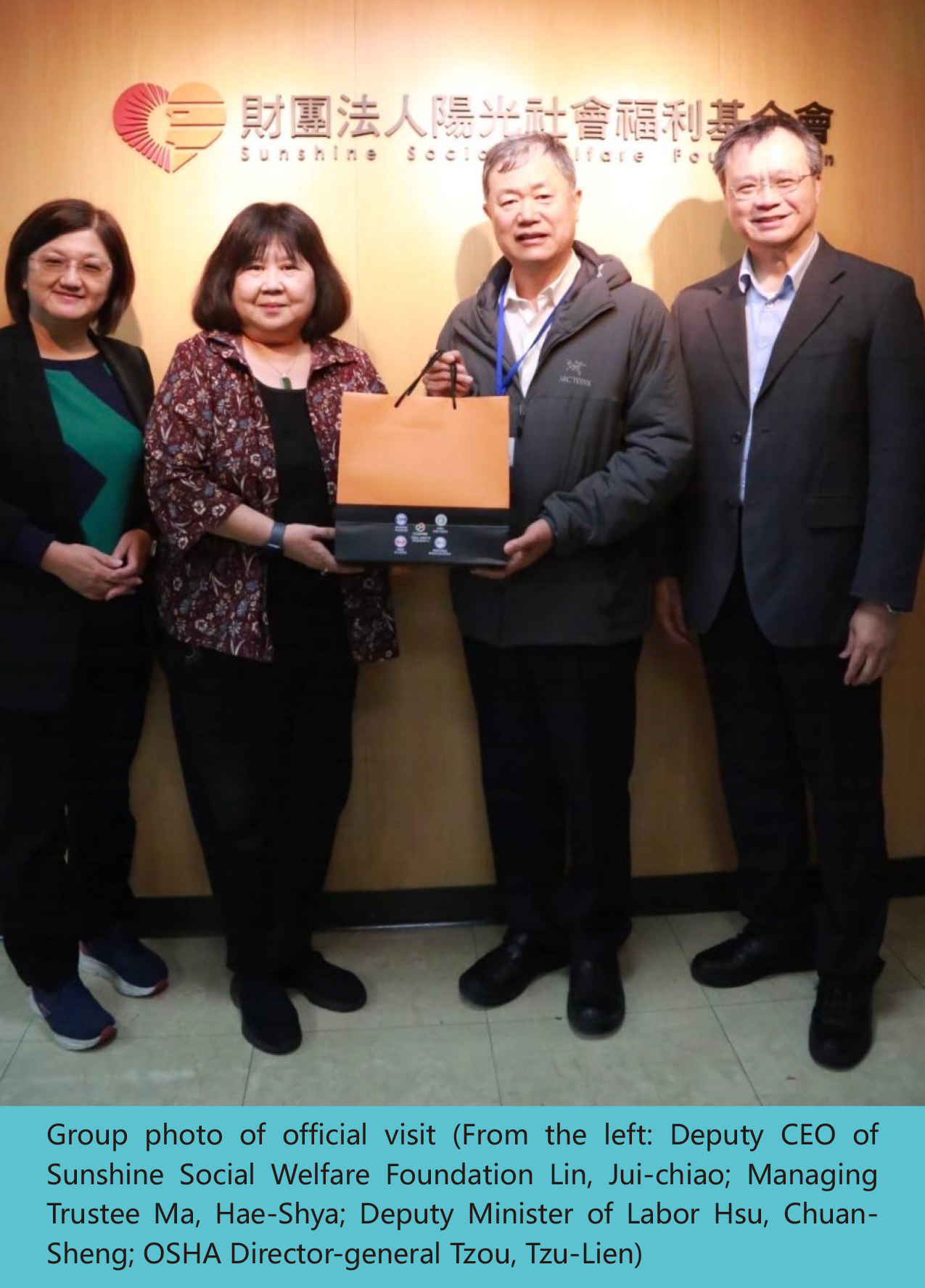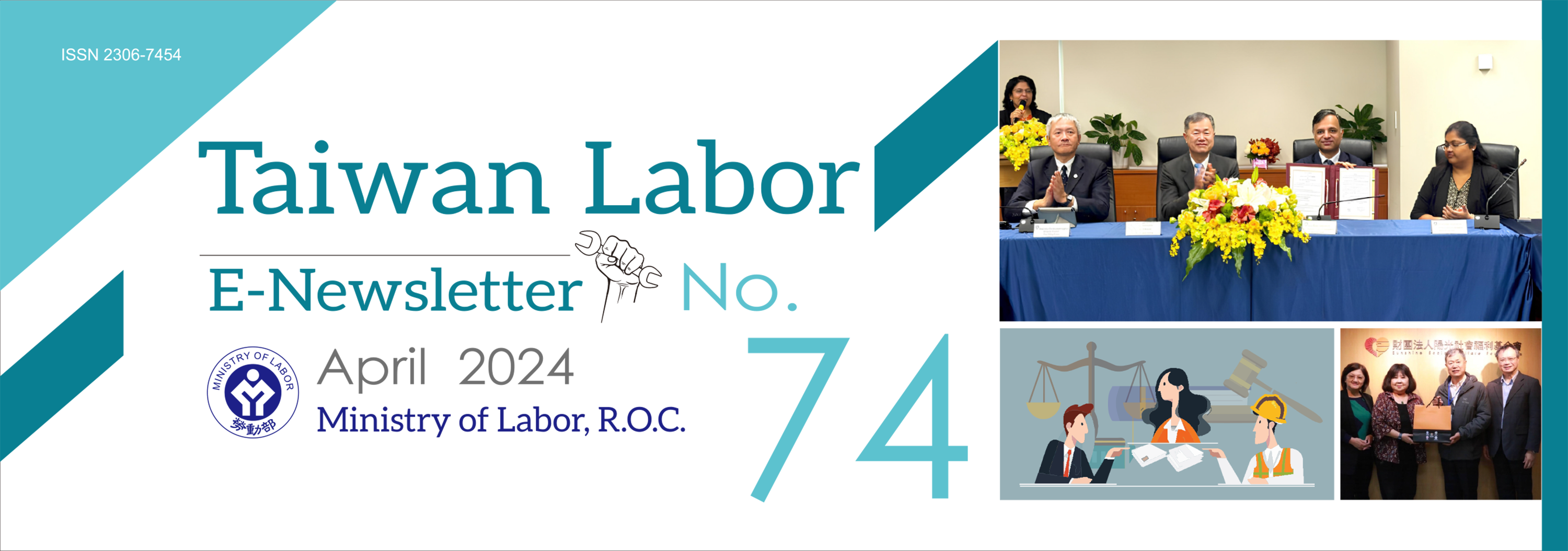NO.74
- Last updated:2024-04-29
- Clicks on the following title, but browses this article fast
- Policies & Regulations Moving Towards a New Milestone in the Prevention of Sexual Harassment with Amendment of "Gender Equality in Employment Act" The Ministry of Labor Promotes 55Plus Employment Promotion Measures to Help Prime-generation Workers Return to the Workforce Rights to Labor Insurance, Employment Insurance, and Labor Occupational Accident Insurance Guaranteed for Part-time Workers
- News Outlook Taiwan and India Sign MOU on Labor Force Cooperation Via Video Conference The Ministry of Labor Continues to Provide Free Professional Labor Dispute Mediation, Helping Workers Quickly Resolve Disputes Public-private Efforts to Protect Workers Affected by Occupational Accidents; Ministry of Labor Welcomes Social Welfare Groups to Commit Efforts to Occupational Accident Rehabilitation Services
Moving Towards a New Milestone in the Prevention of Sexual Harassment with Amendment of "Gender Equality in Employment Act"

New regulations on the prevention of sexual harassment in the workplace provided by Gender Equality in Employment Act were officially promulgated on March 8, 2024. The new system enhances employers' awareness and responsibility for prevention of sexual harassment. It stipulates that employers must take immediate and effective corrective and remedial measures regardless of whether they receive complaints from victims or have heard of sexual harassment taking place; employers must also provide assistance or referrals for advice or medical or psychological consultation. In addition, an external public authority complaint investigation mechanism is established, and administrative penalties for perpetrators of sexual harassment who are at the highest level of responsibility and employees have been added for more complete protection of victims and to prevent sexual harassment incidents in the workplace.
The Ministry of Labor (MOL) has held more than 20 meetings and completed the revision of 7 sub-laws. It also provided 3 templates based on the size of industry establishments and compiled a manual for handling complaints of sexual harassment in the workplace for reference. The MOL has established a Reporting System for Cases of Sexual Harassment in the Workplace in response to the requirements of the new law for employers to notify local competent authorities upon receipt of complaints from victims or the investigation results confirming sexual harassment cases. If needed, industry establishments or local competent authorities can select external gender awareness professionals from the Workplace Sexual Harassment Investigation Professional Talent Database for assistance.
When employers of industry establishments, regardless of size, are aware of sexual harassment in the workplace, they must proactively handle the situation, empathize with those who have been sexually harassed, and prevent sexual harassment from happening again. At the same time, employers must also provide assistance or referrals for advice or medical or psychological consultation, and make necessary clarifications or initiate investigations on the incident.
The MOL will promote comprehensive education and awareness measures to enable employers, job seekers, and employees in various industries to establish correct concepts with respect to sexual harassment prevention and create a truly friendly work environment. Industry establishments can ask the local competent authorities if they have any questions when handling sexual harassment incidents in the workplace. Regulatory resources have been placed on the MOL website for reference by anyone interested.
Keywords: Amendment of the Gender Equality in Employment Act, Gender Equality in Employment Act, Prevention of Sexual Harassment in the Workplace
The Ministry of Labor Promotes 55Plus Employment Promotion Measures to Help Prime-generation Workers Return to the Workforce

The Ministry of Labor (MOL) officially promulgated the 55Plus Employment Promotion Measures for the Prime Generation in February 2024 in order to increase the labor participation of the older generation and encourage employers to create a friendly workplace environment. The measures provide employment incentives to encourage those aged 55 and retirees aged over 45 to return to the workforce. Anyone who has been out of the workforce for more than 3 months and is recommended for employment by a public employment service agency will receive a maximum subsidy of NT$60,000 after being employed for 90 days. Employers are also encouraged to provide the prime-generation workers recommended by public employment service agencies with help to adapt to the workplace environment, such as providing dedicated education and training mechanisms, flexible adjustment of working hours, family care assistance or subsidies, and other friendly measures. Each person is subsidized with workplace support and counseling fees of NT$3,000 per month for up to 12 months, and up to NT$300,000 per year in subsidies are provided for the same employer. The measures are expected to help 60,000 prime-generation workers find employment each year.
The MOL will also develop industry and occupation-specific job redesign service guidelines, which are aimed at helping industry establishments eliminate employment barriers for the older generation through improvement of work methods and processes. It also hopes to expand the eligible subjects of assistance measures for retirees reentering the workplace, promote the postponement of retirement, and continue to strengthen existing measures to help the prime generation continue to work. These measures include prohibiting age discrimination and enforcing equal rights in the workplace, subsidizing employers to provide on-the-job training to improve their employees' skills, providing free vocational training for unemployed workers, enhancing employment preparation through workplace learning and readjustment programs, promoting work-life balance and optimizing the workplace environment, expanding the database of retired talent to revitalize the workforce of retirees, deploying elderly employment service bases to provide assistance to local employment, and expanding service networks with ministry bases to increase service capacity.
The attitudes and experiences that the prime generation bring with them are crucial assets for the operations and growth of enterprises, and employers are increasingly becoming aware of the value they bring. By effectively harnessing the strengths of this demographic, industry establishments can enhance their operational efficiency. Thus, it is believed that the prime generation will become indispensable assets for enterprises.
Keywords: Prime Generation, Employment Incentives, Middle-aged and Elderly Employment
Rights to Labor Insurance, Employment Insurance, and Labor Occupational Accident Insurance Guaranteed for Part-time Workers

With the arrival of the spring semester, young graduates-to-be from colleges and universities are choosing to engage in part-time work to build up workplace experience for their future careers. The Ministry of Labor (MOL) gives this reminder: regardless of whether employees are employed full-time or part-time, employers are required by law to enroll workers in labor insurance, employment insurance, and labor occupational accident insurance on the day the employee reports for work.
The MOL emphasized that labor insurance, employment insurance, and labor occupational accident insurance provide workers with economic security when accidents covered under insurance occur, and they all have a huge impact on workers' rights and interests. According to the Labor Insurance Act, companies, banks, and other employers that employ more than 5 workers are compulsory insurance units and the employers must apply for labor insurance for the workers they employ. For those employing fewer than 5 workers, the employer may apply for insurance for the employees. In addition, in accordance with the provisions of the Employment Insurance Act and the Labor Occupational Accident Insurance and Protection Act, industry establishments are compulsory insurance units regardless of the number of employees, and must apply for employment insurance and labor occupational accident insurance for the workers they employ. The above provisions also apply to workers regardless of whether they work full- or part-time. Fines will be imposed on employers who fail to apply for insurance for workers in accordance with regulations; and if the worker suffers losses in insurance benefits, the employer will be liable for damages. In addition, if an employee encounters an occupational injury or illness, after the employee claims benefits from labor occupational accident insurance, the employer shall also pay the amount of the labor occupational accident insurance benefit.
The MOL also said that in addition to applying for insurance for employees in accordance with the law, employers should also verify the declared monthly insured wages based on the total monthly salary of employees and in accordance with the provisions of the labor insurance salary grade table and the labor occupational accident insurance salary grade table. If the total monthly salary of part-time workers is lower than the minimum wage (currently NT$27,470), the monthly insured wage for labor insurance and employment insurance should be declared starting from NT$11,100. Labor occupational accident insurance should be declared based on the minimum wage for compliance with regulations and to ensure the workers' insurance benefit rights.
Keywords: Labor Insurance, Employment Insurance, Labor Occupational Accident Insurance
Taiwan and India Sign MOU on Labor Force Cooperation Via Video Conference

The governments of Taiwan and India completed the signing of a memorandum of understanding (MOU) on labor force cooperation via a video conference on February 16, 2024 between the Taipei Economic and Cultural Center in India and the India-Taipei Association, after years of negotiations. The exchange of letters and signing procedures were completed on the 26th of the same month. Taiwan and India will convene work-level meetings as soon as possible to continue discussing details for the future, such as industries for which they will be recruiting and numbers, the professional skills and qualifications of foreign workers, and recruitment methods.
The Ministry of Labor (MOL) will continue to collect opinions and suggestions from various sectors of the public walks of life, in light of the external reports of suggestions from Taiwan and India. It will also invite experts and scholars who are familiar with India, representatives of Taiwanese businesses, employer groups, foreign worker groups, and certain ministries to hold consultation meetings to provide opinions addressing concerns about foreign workers from India and to carefully assess the impact on various aspects of Taiwan's society. The MOL will proceed incrementally and pragmatically to build a social consensus and plan the introduction of small-scale pilot projects, the results of which it will review regularly.
Keywords: Ministry of Labor, India, MOU
The Ministry of Labor Continues to Provide Free Professional Labor Dispute Mediation, Helping Workers Quickly Resolve Disputes

The Ministry of Labor (MOL) stated that it regularly communicates with local government leaders on current implementation, in order to maintain the quality of mediation and improve the professionalism and coordination skills of mediators. It stated that it has also called nearly 300 labor dispute mediators to return for training. In February 2024, a consensus was reached through discussion with local government leaders: When accepting applications for mediation, the applicant is requested, as much as is possible, to provide evidence and information related to the case, so as to help formulate a settlement plan. In addition, when mediation fails, workers can use administrative resource information (such as legal aid measures, information on organizing unions, etc.). After mediation is complete, the mediation application, case evidence, and mediation records will be archived to facilitate subsequent review and consideration by the court during labor mediation in accordance with the provisions of the Labor Incident Act.
The MOL also stated that in order to improve mediation efficiency, it has provided subsidies to local governments to hire professional lawyers to assist workers "during mediation" since 2020. In 2023, 471 cases received support, and the number of cases and amounts involved have doubled. In order to increase support, "wage" and "transfer" disputes were included beginning last year (2023). Workers identified as indigenous, new immigrants, or those with disabilities are excluded from the limit of amounts requested exceeding NT$10,000; and support and resources are provided for disadvantaged workers seeking mediation.
The MOL further explained that since 2009, it has entrusted the Legal Aid Foundation to handle the Labor Legal Assistance program for workers whose mediation has failed. As of the end of 2023, nearly 37,000 cases of legal aid have received assistance, with an average case success rate of 70%, making it a powerful support for labor. Beginning in September 2024, the amended law will include "wage disputes" within the scope of assistance. This is estimated to help an additional 1,400 workers each year.
The MOL emphasized that the focus of it policy is maintaining the service quality of labor dispute mediation mechanisms. If workers' rights and interests suffer damages which cannot be resolved through a company's internal complaint channels, they should make good use of the fast, professional, and free mediation mechanisms and other forms of assistance. Anyone with such a need can apply at the labor administrative authority (such as the MOL) of the "place where the labor is being provided," or they can call for inquiries.
Keywords: Labor Disputes, Legal Aid, Mediation
Public-private Efforts to Protect Workers Affected by Occupational Accidents; Ministry of Labor Welcomes Social Welfare Groups to Commit Efforts to Occupational Accident Rehabilitation Services

The Ministry of Labor (MOL) provides subsidies to certain groups each year to actively engage in rehabilitation services for workers in occupational accidents, thus enhancing its ability to serve those workers. Deputy Minister of Labor Hsu Chuan-Sheng paid a special official visit to the Sunshine Social Welfare Foundation on March 4, 2024. Deputy Minister Hsu thanked the foundation for its years of contribution to workers with burns and scalds caused by occupational accidents. Not only has the foundation established multiple bases in northern, central, southern, and eastern Taiwan to provide physical, psychological, and other rehabilitation services; it has also actively committed its efforts to custom design of assistive device manufacturing services to assist them in their rehabilitation and return to work smoothly. The foundation has also successively set up "auto spas" and gas stations to provide workers injured in occupational accidents with an environment that is adaptable as well as stable, improving their employment competitiveness for when they return to the labor market while also safeguarding their dignity and value of life.
The Sunshine Social Welfare Foundation has continued to receive subsidies from the MOL since 2010. It is committed to serving workers who have burns or facial injuries from occupational disasters, including the Lian Hwa Foods Corp. Beidou, Changhua factory fire and the Launch Technologies Co. Pingtung factory explosion that both attracted society-wide attention in 2023. These two disasters resulted in many workers suffering burns and scalds. The Sunshine Social Welfare Foundation cooperated with local governments and nearby hospitals through horizontal referrals to provide workers with care, support, and integrated services, enhancing service capabilities beyond that provided by central and local labor administrative agencies and medical institutions.
Deputy Minister Hsu further encouraged social welfare groups from all sectors of society to apply for occupational accident labor rehabilitation subsidies stipulated in the Labor Occupational Accident Insurance and Protection Act, and to jointly contribute to rehabilitation services for workers affected by occupational accidents to help them return to work as soon as possible, adding that it will help their re-entry into the labor market and achieve the best outcome for both labor and management. Visit the official website of the Occupational Safety and Health Administration (OSHA) for more information.
Keywords: Occupational Accident Labor Rehabilitation Services, Occupational Accident Labor Rehabilitation Subsidies, Workers Returning to Work after Occupational Accidents
- Source:Department of General Planning
- Publication Date:2024-04-29
- Count Views:
File
- Taiwan Labor E-Newsletter No74 pdf

